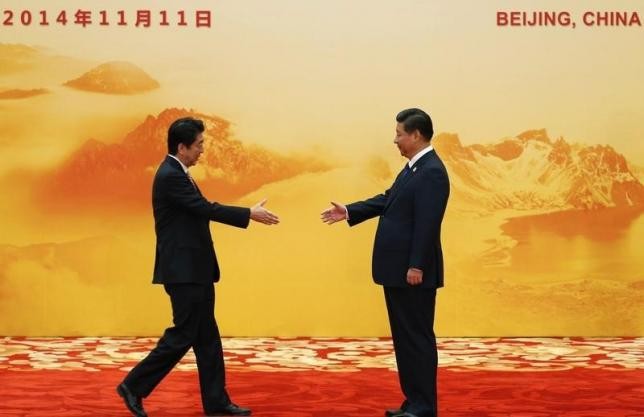Japan is trying to pursue a meeting with China involving the countries’ financial ministers, Japan’s Financial Minister Taro Aso revealed on Tuesday.
The meeting, which is eyed to be held in Beijing in June, is perceived by many as Japan's move to get their troubled ties with China back on track.
However, the country remains cautious regarding this matter as Japan recently announced its aggressive territorial claims over Diaoyu Islands. In addition, China, together with South Korea, has also condemned Japan's incorrect history textbooks.
In Japan's 2014 Diplomatic Bluebook, it has accused China of East China Sea's "unilaterally changing the status quo."
Japan also stated in its history reference books that it has "sovereignty" over the Diaoyu islands. The books also obscure the Japanese army's role during the Nanjing Massacre in China during the World War II.
Chinese foreign ministry spokeswoman Hua Chunying clarified that "whatever Japan adopts to publicize its mistaken position, there is no way it can change the fundamental fact that the Diaoyu Islands belong to China."
Hua also urged Japan to "adopt a responsible attitude toward history" on top of educating "the next young generation with correct historical views."
The dialogue between the two financial ministers would be the first time in more than three years if it will be confirmed, Aso remarked. He said: "We are trying to hold it, although I don't know the date."
Asked about the issue of the Asian Infrastructure Investment Bank (AIIB), which China backs, Aso said that he would ask for transparency during the meeting should it transpire.
Last week, Tokyo ruled out any plan to join the financial institution.
China has announced on Tuesday that around 35 countries were approved as targeted founding members of the investment bank. These include France, the United Kingdom and Germany.
According to Hu Lingyuan, a professor at the Japan Research Center in Shanghai's Fudan University, "the meeting carries both symbolic and practical significance."
The professor told the Global Times that "on one level, [the meeting] is a sign that, despite differences, Beijing and Tokyo are working to thaw icy relations, one step at a time. On another level, there may be substantive discussion about a free trade agreement between China, Japan and South Korea as well as on AIIB."
Furthermore, Hu believes that the meeting will serve as an avenue for Japan to ask about concerns on government structures as well as other relevant information on AIIB.
According to Yang Bojiang, a professor at the China University of International Relations, "the signals [sent by Japan] are paradoxical because relations between the two countries are essentially quite complicated."
In a Global Times interview, Yang said that "it will be a huge mistake to believe that Japan wants to restore ties [with China] on every front. It wants to continue working with China on economic issues to boost its domestic economy. But with political, historical and territorial issues, Japan will not give up its hard-line position."
The ties between China and Japan have been out of track from 2012 when Japan announced that it would "nationalize" the Diaoyu Islands. Beijing has since sent maritime patrols nearby regularly.
The diplomatic gridlock was believed to be broken when Japan's Shinzo Abe and Chinese President Xi Jinping met in November during the Asia-Pacific Economic Cooperation forum held in Beijing.
The two countries, together with South Korea, also held their first trilateral talk in three years in Seoul in February.



























